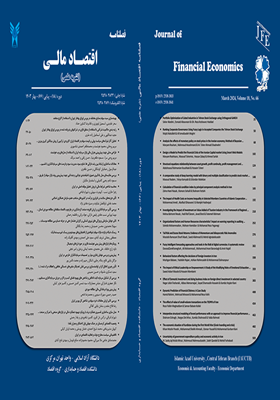مدل سازی ساختاری تفسیری عملکرد برند با رویکرد بهبود عملکرد مالی در بازارهای صنعتی با تمرکز بر صنعت پتروشیمی
محورهای موضوعی : اقتصاد مالی
شهرام اشراقی
1
,
نرگس دل افروز
2
*
![]() ,
کامبیز شاهرودی
3
,
یلدا رحمتی
4
,
کامبیز شاهرودی
3
,
یلدا رحمتی
4
![]()
1 - گروه مدیریت بازرگانی ، واحد رشت ، دانشگاه آزاد اسلامی ، رشت، ایران
2 - گروه مدیریت بازرگانی ، واحد رشت ، دانشگاه آزاد اسلامی ، رشت، ایران
3 - گروه مدیریت بازرگانی ، واحد رشت ، دانشگاه آزاد اسلامی ، رشت، ایران
4 - گروه مدیریت بازرگانی ، واحد رشت ، دانشگاه آزاد اسلامی ، رشت، ایران.
کلید واژه: L65, M37, واژههای کلیدی: عملکرد برند, صنعت پتروشیمی, بازده فروش. طبقه بندی JEL : M31,
چکیده مقاله :
چکیده هدف: امروز رقابت سنگین در صنعت پتروشیمی میان کشورها ایجاب میکند که توجه به بحث برند در اولویت قرار گیرد به خصوص شرکتهای مرتبط با صنعت پتروشیمی در ایران بدلیل مباحث تحریمی، میتوانند با ایجاد برند صنعتی قوی در حفظ مشتریان خود حرکت کنند. در تحقیق حاضر به طراحی مدل عملکرد برند در صنعت پتروشیمی پرداخته شد. روش: تحقیق به شیوه آمیخته انجام شد. جامعه آماری تحقیق شامل خبرگان و کارشناسان فروش و بازاریابی 7 شرکت پتروشیمی بودند که تعداد 7 نفر از خبرگان از این شرکتها و 238 نفر از کارشناسان فروش و بازاریابی به عنوان اعضای نمونه آماری در نظر گرفته شدند. با انجام مصاحبه با خبرگان حوزه برند در صنعت پتروشیمی و همچنین مطالعات کتابخانهای به شناسایی مفاهیم و مولفههای اساسی عملکرد برند پرداخته شد. از میان 28 مولفه شناسایی شده از مطالعات کتابخانه ای، تعداد 11 مولفه در تحلیل خبره به عنوان مولفههای مدل عملکرد برند شناسایی شدند که مبنای تجزیه و تحلیل قرار گرفتند. یافته ها: نتایج حاصل از انجام تحلیل عاملی تاییدی نشان از آن داشت که از بین 11مولفه مذکور، تنها تعداد 7مولفه به طور معنادار و قابل توجهی، عملکرد برند را تبیین میکنند. این 7 مولفه عبارتند از: بازده فروش، نوآوری در پاسخگویی، الگوبرداری، سرمایه سازمانی برندمحور، استراتژیهای رقابتی سازمانی، کیفیت محصولات، تولید و حجم فروش. همچنین نتایج نشان داد که عملکرد برند در صنعت پتروشیمی از نظر نوآوری در پاسخگویی به مشتری و تولید و حجم فروش در وضعیت مطلوبی قرار ندارد. نتیجه گیری: از پیامدهای بهبود عملکرد برند در این صنعت، مطابق با الگوی تحقیق، میتوان ارتقای سطح کیفی محصولات، تأمین انتظارات بازار، افزایش تعهد و وفاداری مشتریان، عملکرد مالی مطلوب و توسعه و رونق صنعت را نام برد.
Abstract Purpose: Today, heavy competition in the petrochemical industry among countries requires that attention to the brand issue be given priority, especially companies related to the petrochemical industry in Iran due to the sanctions issues, can move by creating a strong industrial brand to protect their customers. In the present research, the design of the brand performance model in the petrochemical industry was discussed. Method: The research was conducted in a mixed method. The statistical population of the research included sales and marketing experts of 7 petrochemical companies, and 7 experts from these companies and 238 sales and marketing experts were considered as members of the statistical sample. By conducting interviews with brand experts in the petrochemical industry, as well as library studies, concepts and basic components of brand performance were identified. Among the 28 components identified from library studies, 11 components were identified in the expert analysis as components of the brand performance model, which were the basis of the analysis. Findings: The results of the confirmatory factor analysis showed that among the 11 components mentioned, only 7 components significantly explain the performance of the brand. These 7 components are: sales efficiency, innovation in response, modeling, brand-oriented organizational capital, organizational competitive strategies, product quality, production and sales volume. Also, the results showed that the performance of the brand in the petrochemical industry is not in a favorable state in terms of innovation in customer response and production and sales volume. Conclusion: One of the consequences of improving the performance of the brand in this industry, according to the research model, can be mentioned the improvement of the quality level of the products, meeting the market expectations, increasing the commitment and loyalty of customers, favorable financial performance and the development and prosperity of the industry.
فهرست منابع
_||_

